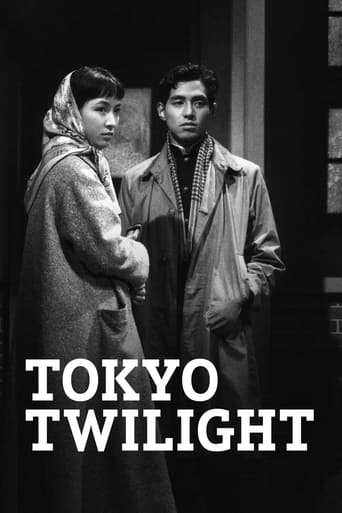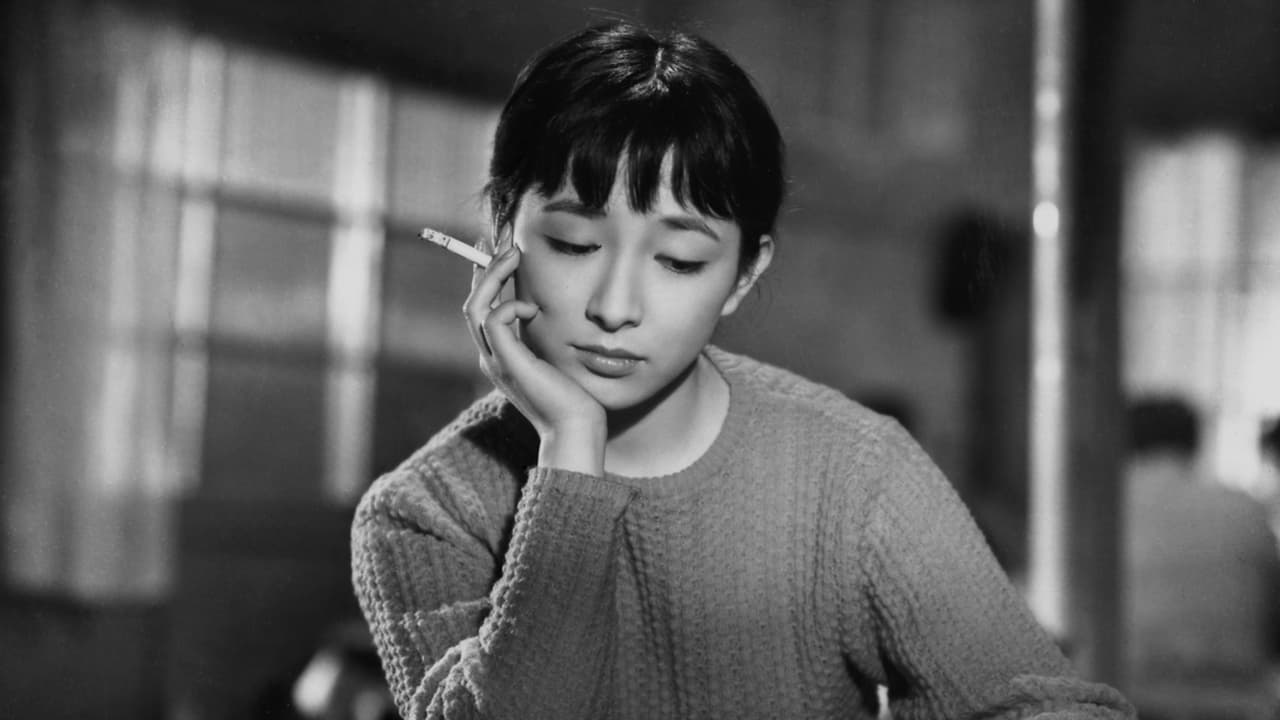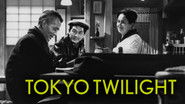Antonius Block
This film is methodical in developing its tale of troubles for a Japanese family, which had a wife run away from her husband and two daughters when they were young, the older daughter (now grown) running away from her own unhappy marriage, and the younger daughter running with the wrong crowd and getting pregnant. Despite all these dark elements, the film is very prim and proper in its delivery, and rather quiet.The older daughter is played reasonably well by Setsuko Hara, but she's upstaged by Ineko Arima, who plays her rebellious younger sister. The scenes with Arima frustrated by her lover's games, dealing with an unwanted pregnancy, and wondering if she was the product of an affair of her mother's are among the best in the film. It was interesting to contrast the handling of abortion by director Yasujiro Ozu with that by 'new wave' director Nagisa Oshima (Cruel Story of Youth, 1960), and the American Robert Mulligan (Love with the Proper Stranger, 1963).The issues I had with the film all relate back to Ozu's direction. Early on in the film you'll notice actors often staring directly into the camera as they deliver their dialogue, particularly the father (Chishu Ryu). These simple shots seem dated, even for the time period. As the film progresses, it's too ponderous in many of its shots and scenes, such that it ends up being much too long at 140 minutes. Lastly, I disliked the fact that it was ultimately a morality tale. With a heavy hand, Ozu essentially tells us it's important to keep a marriage together even if it's unhappy, because one parent will not be enough. The message is dated, and his delivery lacks artistry.
boblipton
I was speaking with my cigar-smoking buddy about John Ford/John Wayne/Maureen O'Hara movies -- we always watch THE QUIET MAN on Saint Patrick's Day. "Why does Wayne bother to tame her," he asked, "When he's going to have to do it all over again the next movie?" I've never been able to convince him of it, but I think the journey can be more fun than the destination. That's the thought that occurred to me when I looked at this movie this morning and saw Ozu's stock company running through variations on their unhappy yet loyal relationships to each other: Chishû Ryû as the father who tried his best and failed; Setsuko Hara as the seemingly obedient daughter, and so forth; the middle class home; the little bar around the corner from the office. It's all there and all as familiar as the nail's level view -- a bent-down nail, because the nail that sticks up gets hammered down.We're told that Ozu is very Japanese and I wouldn't understand, but I find his world very familiar, even if everyone speaks Japanese. Growing up, I didn't understand Yiddish -- I still don't -- but my parents and uncles and aunts did and held conversation in it when they didn't want us to understand. Sometimes the discussions would escalate to shouting, and when I would ask what was going on, I would be told "You wouldn't understand." So that's what Ozu seems like to me: the same people, the same problems, the same language so I wouldn't understand -- but with subtitles. With the same cast, just like my family. As Wayne said to Howard Hawks on another occasion, this time, can I play the drunk?
Andres Salama
Tokyo in the mid 1950s. In this stereotypical women's picture, a single, middle aged man (Chishu Ryu, an Ozu regular), tries against all odds to raise his two grown troubled daughters. One (the great Setsuko Hara, another Ozu regular) is a single mother who has left her husband and return to his father's home. The younger daughter is even more troubled, is surrounded by bad companies, and has become pregnant by her no good boyfriend. Soon, the two sisters find in a mahjong joint their long lost mother, who seems curiously unmoved at learning that her son has died years ago in a climbing accident. The sloppy plot hurts the movie a lot (only in bad melodramas, one of the characters commits suicide by throwing herself under a train, but doesn't die until she tells her story). To its credit, though, this film tackles the issue of abortion decades before western films did, but this is still minor Ozu, somewhat moving, but done in by its unnecessary melodrama and its barely believable plot points. There are many movies Ozu made during this era - from Tokyo Story, Floating Weeds, Early Summer, Late Spring, Good Morning, End of Summer, etc., that are better than this. Still, worth seeing if you are not expecting a masterpiece.
rschmeec
This is a relatively "dark" film, symbolized by the cold weather outside throughout the film, and the various ways (wearing masks, sitting close to the fire, snuggling up) in which the characters cope with the cold.I cannot agree with the previous review's strictures about the leading male character, that he is paternalistic, passive, and judgmental. What came across to me was that he cared deeply for his children and accepted his responsibility as a parent to address their problems. He has been abandoned by his wife and the mother of his children, he says he has done the best he could to raise them, at the same time acknowledging the need for children to have two parents. The theme of parental responsibility seems a common element in this with the last Ozu film I saw: THERE WAS A FATHER.Although this is a rather "dark" film, the ending, like that of many of Shakespeare's plays, ends in some form of reconciliation: the one daughter wanting to start a new life, the other deciding to return, with her child, to her husband, from whom she has been separated.


 AD
AD



